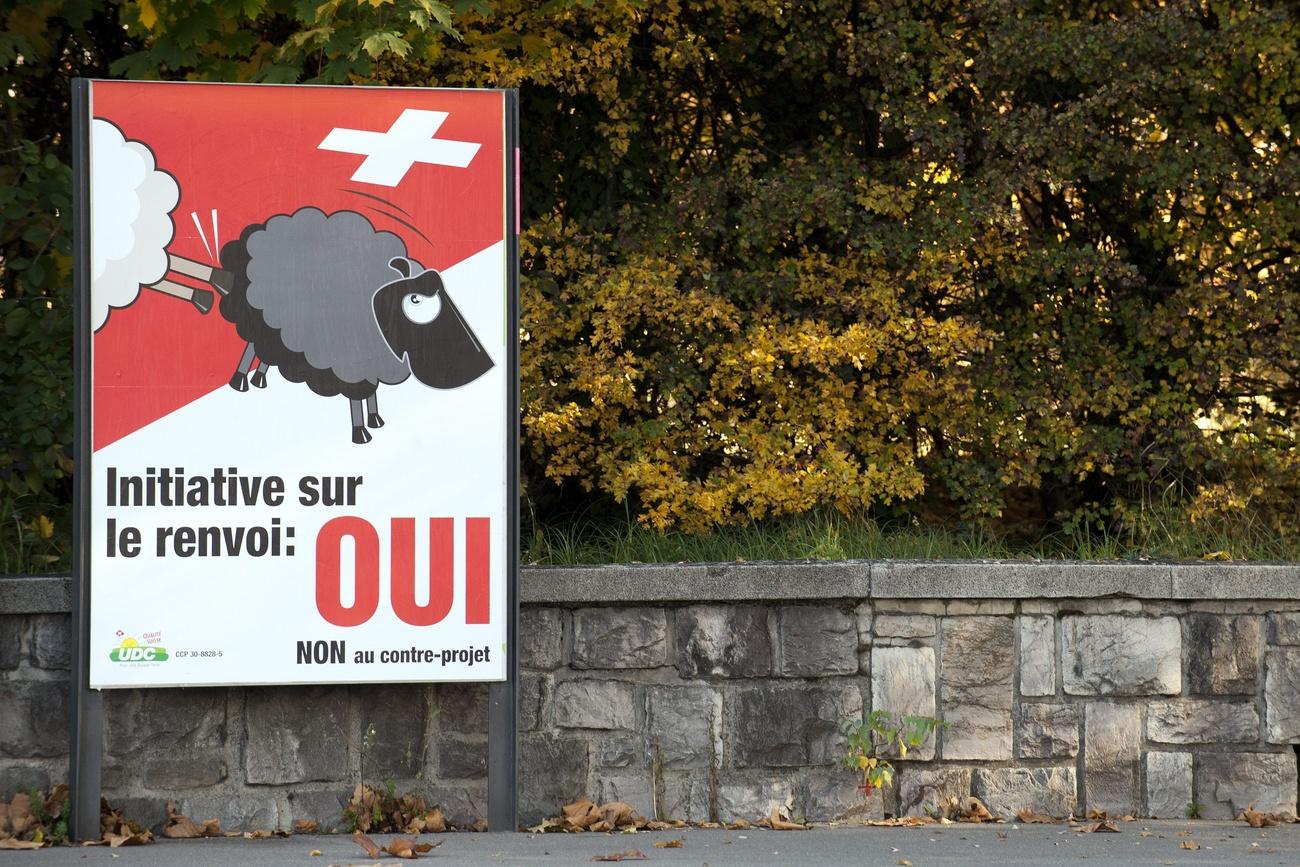‘Revolution will never start in Switzerland’

Populism isn’t just a right-wing phenomenon. A case in point: Tamara Funiciello, the outgoing – and outspoken – president of the Swiss Young Socialist Party.
According to a recent University of Zurich research paper, Switzerland is home to three populist parties: the right-wing People’s Party (the biggest in the country), the anti-immigrant Lega di Ticinese (a small regional group from Italian-speaking Switzerland), and the Mouvement des Citoyens Genevois (an even smaller regional group from Geneva).
On hearing this, Tamara Funiciello, the 29-year-old president of JUSO, the youth section of the Swiss Social Democrats, is mock-outraged: “Why aren’t we named?!”
The author of the report does indeed admit that JUSO displays populist tendencies, I tell her – but it wasn’t included in the final analysis since, as a youth party, it’s relatively marginalised when it comes to mainstream politics.
“Well – good…” says Funiciello, an answer that shows off much of her political character: contrarian, self-deprecating, far from diplomatic – and proud, or at least unashamed, to be populist.
Over the past three years, since taking the lead at JUSO, Funiciello has been mixed up in a series of publicity-grabbing and (by Swiss standards) outlandish schemes.
There have been the political campaigns, the 99% initiative, for example, which aims to clamp down on the super-rich in a country traditionally cosy towards wealth; the clickbait operations, when a group of JUSO women went topless against sexismExternal link; the “shitstorms”, as when she described a much-loved local pop song as “sexist” and went on to receive floods of threats and misogynistic slursExternal link.
Now, having announced August as the end date for her stint as JUSO head, she is poised to take her energies to the grown-up political stage by standing in October’s parliamentary elections.

More
Populism – what’s in a word?
Re-claiming populism
Is she planning to take her radical form of populism with her?
Perhaps. But if Funiciello identifies with the term populism, it’s more as a communication tool and strategy rather than as the anti-elitist and anti-immigrant political ideology that has been spreading across Europe over the past few years.

More
‘Revolution will never start in Switzerland’
She doesn’t “claim” the term in the same way that some political figures on the right are starting to: former Trump strategist Steve Bannon, for example, who has gladly seized on the label as a way to capture the nationalist “revolts” that he sees sweeping through the West.
Funiciello wants to re-claim it from them. The rhetoric of people like Matteo Salvini in Italy and Marine Le Pen in France is dangerously close to fascism, she says. When we talk about them as some new breed of right-populist, we underestimate the malignancy of their message – “the word populism sounds less bad.”
So what does she mean when she uses it to describe herself?
“We just try to explain things in an easy way. When you don’t simplify, as a party, you have no chance.”
This is the second part of a three-part series on populism in Switzerland. On Tuesday we published an overview of the situation, and on Thursday take a look at why embracing populism could be the best way forward. Here’s an attempt to define what populism actually means.
Catchphrase, hook, explain
That said, she also reckons that it’s elitist to think that political subjects are “too complex” for people to understand. It’s more that people just don’t have a lot of time, she says.
“If you can’t connect with them emotionally, they aren’t interested.”
Populism, so, is one step in a much longer communications strategy. First comes the catchphrase (“tax the 1%!”) to hook the public’s attention (on social media, for example, built for such soundbites). Then the media goes more in-depth on the issue (such as with an article about the link between economic inequality and social stability). And finally – hopefully – political change comes about.
She thus sees herself and her party as part of a process rather than an end in itself. A process not just within a society where politics, media, and public all play a role in shaping discourse, but also within her own party, where JUSO sometimes plays the role of extremist instigator compared with its soberer and more pragmatic parent.
Learning from the enemy
It was the relative inability of the Social Democrats and centrist parties to counter the fantastically populist communication strategy of the Swiss People’s Party that led JUSO towards a more extreme stance in the first place.
Funiciello freely admits that her party’s radical change in PR strategy was directly inspired by the People’s Party, which was the first to realise how best to manipulate the media system (its emblematic figurehead Christoph Blocher – “Trump before Trump”, in the words of Bannon – is a maestro). As far back as 2008, she says, JUSO members have been studying what the People’s Party does, then trying to emulate it and outflank it from the left.
Here, she comes close to the style of Operation Libero – the young activist groupExternal link that led a successful and colourful campaign against an initiative to deport foreign criminals in 2016 – and even new publicity-savvy figures like Congresswoman Alexandra Ocasio-Cortez in the US, whom Funiciello cites as a political inspiration.
Isn’t it all this dumbing-down and simplifying of politics a race to the bottom?
Funiciello is not starry-eyed about the digital shouting factory and admits it’s not taking society in a good direction. But she also dismisses the suggestion that her communication style makes the problem worse. Rather, she criticises the way today’s media works, a mechanism she simply uses “to profit from the clicks” and to push forward her socialist, feminist, progressive agenda.
“It’s the media that has to become a public service rather than continue to operate according to market logic,” she says. If journalists continue to act simply as passive transmitters of messages rather than active shapers of discourse, the loudest and brashest will win out.

The revolution-proof country
As for Switzerland, which occupies the peculiar role of being simultaneously politically stable and extremely populist (“oh yes, we are the most populist country,” says the JUSO leader), Funiciello agrees that much of this is down to the direct democratic system.
“Revolution will never start in Switzerland,” she says – no matter how much people such as her might wish for it. Because of the layered systems of governance – consensus-obsessed executive, two-chambered parliament, wide decentralisation – “nobody can get to a situation where they have enough power to change big things”.
Even when parliament does go and make a “crazy” decision, there’s always the possibility of challenging it by collecting 50,000 signatures for a referendum.
Though she says she is “neutral” about the direct democracy system, it’s with a tone of idealistic impatience, as if (like many activists in a conservative country) she feels flummoxed by the slow rate of change. Last year, in another choice soundbite, she told Beobachter magazine that she does politics “to change the world, not to talk about bike lanes”.
Just as Funiciello’s communication style will always somehow separate her from mainstream political speak (until the not-too-distant day when populist discourse itself becomes mainstream; are we already there?), her idealistic drive to change things may also alienate her from the daily parliamentary grind.
No problem, she says – she’d much rather stay true to the fight than tone things down.
“If I’m not elected [in parliamentary elections this October] I don’t mind too much,” she says, before mentioning the recent women’s strike in Switzerland, where she played a key role.
“The big political changes of the future will not be happening in the parliament in any case. They’ll be happening on the street, and I’ll be there.”

In compliance with the JTI standards
More: SWI swissinfo.ch certified by the Journalism Trust Initiative












You can find an overview of ongoing debates with our journalists here . Please join us!
If you want to start a conversation about a topic raised in this article or want to report factual errors, email us at english@swissinfo.ch.